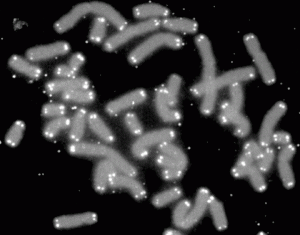I don’t want to die. Ever. Don’t ask me what I would do after I would have visited all the countries in the world and watched all the re-runs of Two and a Half Men. I just don’t want to die.
I’m not the only one. For as long as history can recall, people have been trying to find ways around death. Whether it is through religion, alchemy or science, us mortals have been trying to put an end to aging and death. Today, scientists might actually be onto something which could give us a shot at immortality.
We know that, in humans, cells reproduce through mitosis, a process in which a cell separates its nucleus’ chromosomes into two identical sets, in two separate nuclei. In 1961, Leonard Hayflick demonstrated that normal human cells can undergo about 40 to 60 divisions before entering a phases of senescence (that is, before becoming old and losing their ability to divide). Senescent cells don’t replace themselves with new cells. They stay in the organism to which they belong, accumulating damage until they reach a point where apoptosis, the process of programmed cell death is reached. A simple way to put it is that once cells stop reproducing, the body gets older.
But why can cells only divide 40 to 60 times? It’s because each time cells divide, their chromosomes get chopped off at both ends. This is fine at first because human cells start off with “caps” of otherwise useless padding of repetitive strings of DNA called telomeres.

Human chromosomes (grey) capped by telomeres (white) Source from Wikipedia
As cells undergo successive divisions, the telomeres get shorter and shorter until eventually they are no longer long enough to enable complete and relatively error-free duplication of the genetic information that they encapsulate.
From this, it seems that if we could find a way to ensure telomeres remain long enough, we could have endless cell divisions, be forever young and become biologically immortal.
It turns out that an enzyme called telomerase lengthens the telomeres by adding bits of DNA padding to them. Moreover, ways to activate telomerase production have been identified.
I should probably nuance the above by saying that there are still many hurdles to be passed before we can get immortality treatment at local clinics. Cancer features prominently among them. Indeed, cancers are collections of rogue cells that gained the ability to divide infinitely through some fluke of the telomere / telomerase regulation mechanism.
That being said, we humans can go very far to get what we want and avoid what we don’t. Many want to avoid death for themselves and those they love. Thus, I wouldn’t be surprised if we finally got our chance at immortality before I die.
The following video is a podcast from Dr. Ed Park explaining the aging as a result of shortened telomeres.

For more information on the topic:
http://www4.utsouthwestern.edu/cellbio/shay-wright/intro/facts/sw_facts.html


5 responses to “Is Immortality at Hand?”